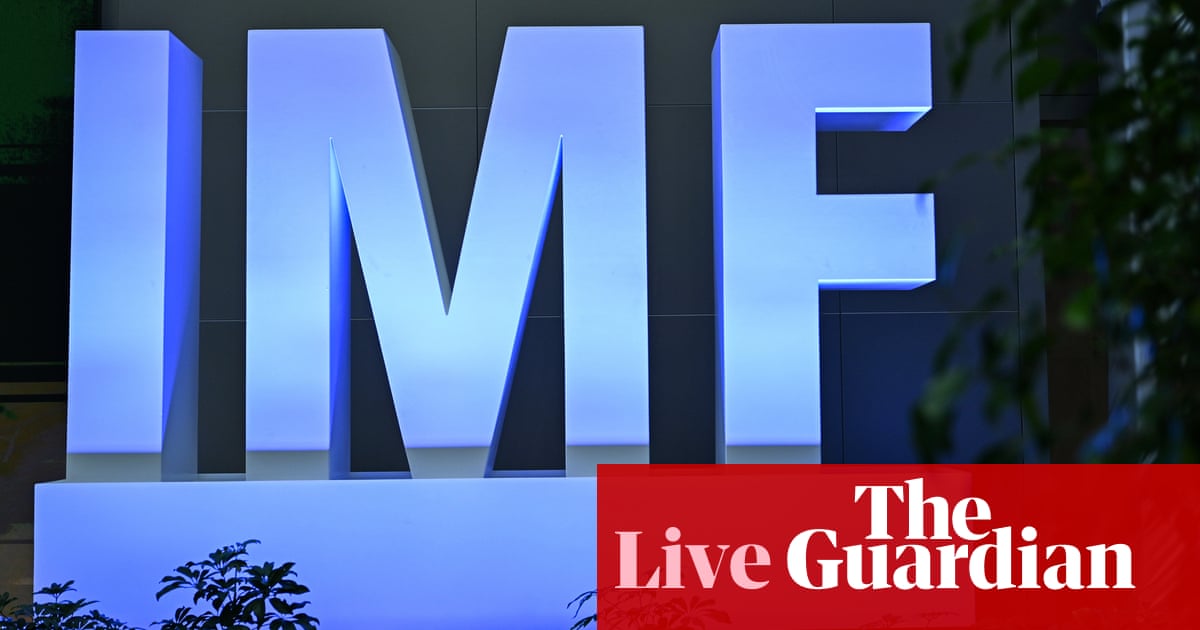IMF: These are ‘anxious times’ as global economy risks low-growth, high-debt path
Over in Washington DC, the head of the International Monetary Fund has warned that the global economy is going through “anxious times”.
Kristalina Georgieva is speaking at a press conference now, and acknowledges that while the economic situation has improved, the public are not feeling better.
Georgieva says the global economy has “held up remarkably well”, with inflation continuing to decline, growth still positive, and interest rates starting to fall
Most of the world, a soft landing is in sight.
But people are not feeling good about their economic prospects.
Georgieva explains that everyone she speaks to at the IMF’s Annual Meeting tells me their economy is “good”, but when asked about the mood of their people, the answer is “not so good”.
She says:
Families are still hurting from high prices, and global growth is anaemic.
Georgieva then reminds reporters that the IMF expects global growth of 3.2% this year, but a slowdown to 3.1% in five years – the weakest medium-term forecast in decades.
“Trade is no more a powerful engine of growth. We live in a more fragmented global economy”.
The IMF also expects public debt to surpass $100trn this year, an alltime high, and equivalent to 93% of GDP. By 2030, that figure is expected to reach 100%.
Georgieva declares:
“The global economy is in danger of getting stuck on a low-growth, high-debt path. That means lower incomes and fewer jobs. it also means lower government revenues so less investment to support families and fight long-term challenges like climate change.
These are anxious times.
Key events
Georgieva adds that globalisation has not delivered for everyone, policymakers must attend to those who have lost out.
IMF managing director Kristalina Georgieva then explains that policymakers must ‘secure the soft landing’ and ‘break out of the low-growth, high-debt path’.
She says they should:
-
Ensure inflation gets back to target, everywhere, without causing unnecessary damage to the jobs market.
-
Act on debt and deficits, after years of “much-needed” fiscal support. Most countries can rebuild their fiscal buffers slowly, Georgieva suggests, but they need to start now.
-
It is “crucial” that countries carry out pro-growth reforms, Georgieva insists, such as cutting red tape and improving governance.
-
Continue to co-operate on issues such as climate, technology, debt and trade
IMF: These are ‘anxious times’ as global economy risks low-growth, high-debt path
Over in Washington DC, the head of the International Monetary Fund has warned that the global economy is going through “anxious times”.
Kristalina Georgieva is speaking at a press conference now, and acknowledges that while the economic situation has improved, the public are not feeling better.
Georgieva says the global economy has “held up remarkably well”, with inflation continuing to decline, growth still positive, and interest rates starting to fall
Most of the world, a soft landing is in sight.
But people are not feeling good about their economic prospects.
Georgieva explains that everyone she speaks to at the IMF’s Annual Meeting tells me their economy is “good”, but when asked about the mood of their people, the answer is “not so good”.
She says:
Families are still hurting from high prices, and global growth is anaemic.
Georgieva then reminds reporters that the IMF expects global growth of 3.2% this year, but a slowdown to 3.1% in five years – the weakest medium-term forecast in decades.
“Trade is no more a powerful engine of growth. We live in a more fragmented global economy”.
The IMF also expects public debt to surpass $100trn this year, an alltime high, and equivalent to 93% of GDP. By 2030, that figure is expected to reach 100%.
Georgieva declares:
“The global economy is in danger of getting stuck on a low-growth, high-debt path. That means lower incomes and fewer jobs. it also means lower government revenues so less investment to support families and fight long-term challenges like climate change.
These are anxious times.
Full story: UK’s borrowing costs rise on news that Reeves is changing fiscal rules
Here’s our news story on the increase in UK borrowing costs this morning amid expectations that Rachel Reeves will change Britain’s debt rules to unlock up to £50bn of additional headroom for investment in infrastructure.
Elsewhere in the City, supplements maker Applied Nutrition has floated on the stock market with a valuation of around £350m.
Applied Nutrition, which is backed by Coleen Rooney, has made a solid if unspectacular debut. The IPO was priced towards the lower of the company’s range, but shares did then open 7% higher than the IPO price.
Liverpool-based Applied Nutrition is also backed by supermarket group Asda’s co-owner Mohsin Issa and by sportswear giant JD Sports.
Bloomsbury tells printers to ‘order more paper’ ahead of Harry Potter TV release
Jack Simpson
The chief executive of publisher Bloomsbury has said the business is “fastening their seat belts” and “telling printers to order more paper” ahead of the release of the HBO’s Harry Potter TV series.
Nigel Newton, who founded the company in 1984, said that books in the Harry Potter series were still some of the country’s most popular, with Harry Potter and the Philosopher’s Stone still a bestseller in the UK, despite being released 27 years ago.
Commenting on the new HBO series which is expected to launch in 2026, he said:
“We saw that when the original Warner Brothers films came out, with the release of each movie the book it was based on shot up to the bestseller list.
“With the series there will be multiple episodes per volume, so the seven books will convert to many, many episodes.”
The comments came as Bloomsbury posted its interim results for the six months to 31 August, which saw pre-tax profit hit £22.1m, up 58% on the same period last year.
Much of this growth in sales is the growing popularity of romantasy fiction, with Bloomsbury publishing books from the genre’s most successful author Sarah J Maas.
Reuters: Thames Water creditors offer company alternative financial lifeline
Crisis-ridden utility firm Thames Water may be thrown a lifebuoy by its creditors to keep it afloat while it restructures its debts.
Reuters are reporting that a group of Thames Water creditors have proposed an alternative liquidity package of up to £3bn to give the company more time to seek a debt restructuring.
Reuters says:
The group, comprising investors with hundreds of millions of pounds worth of so-called B notes, hope their plan will compete with one proposed by a more senior ranking group of A bondholders, two sources said, speaking on condition of anonymity because the matter is private.
The group, whose members include large institutional investors and banks, is offering the company a new debt facility of £1.5bn to £3bn, at an interest rate of 8%, according to the sources.
It is unclear if the company will consider the proposal or how the group will put it together.
Thames, whose credit rating has been slashed deep into junk territory, warned last month that it could run out of cash as soon as December.
It has been asking its lenders to relax its repayment terms, to give more time to tackle its £15bn debts pile.
UK manufacturing confidence falls as new orders contract
More gloom!
Sentiment across the UK manufacturing sector has fallen at the fastest pace in two years, according to the CBI’s latest healthcheck.
The CBI’s Business sentiment index has fallen to -24%, down from -9% in July, showing that more companies were pessimistic rather than optimistic about their prospects.
Export optimism for the year ahead also fell, to -16%, from 0% three months ago.
Companies also reported that output fell in the last three months
Total new orders fell in the quarter to October, driven by the sharpest decline in domestic orders since July 2020, as well as lower export orders.
Ben Jones, CBI lead economist, says:
“Sentiment in the manufacturing sector appears to have soured in recent months. Demand has softened both at home and abroad. And although cost pressures have eased, costs are still rising faster than prices, implying a further squeeze on margins.
The recent downturn is expected to bottom out in the coming quarter, which is encouraging. But amid a more uncertain outlook manufacturers have scaled back their plans to invest in buildings, capital equipment, innovation and training.
Jones adds that manufacturers want a confidence-boosting budget that supports business and leads to more investment, concluding:
While possible tax rises remain a concern, firms believe that clarity over future tax plans, measures to enhance productivity, and the country’s net zero trajectory can all help cement the path to long-term growth.”
The latest CBI Industrial Trends Survey found that output volumes fell slightly in the quarter to October, after falling at a rapid pace in September. Firms expect volumes to be broadly unchanged in the next three months. #ITS pic.twitter.com/C5DBe50NDX
— CBI Economics (@CBI_Economics) October 24, 2024
The main constraint on investment was uncertainty about demand, followed by inadequate net returns, a shortage of labour and a shortage of internal finance. Concerns around the cost of finance have retreated from a 33-year high set in January (excluding the pandemic period). #ITS pic.twitter.com/E2JBxMN6G3
— CBI Economics (@CBI_Economics) October 24, 2024
Numbers employed rose in the quarter to October, for the first time since July 2023. Firms expect numbers employed to be broadly unchanged in the next three months. #ITS pic.twitter.com/DGz7jChnbH
— CBI Economics (@CBI_Economics) October 24, 2024
Christmas spending at risk as consumer confidence drops
UK consumer confidence has fallen, driven by gloom among older people and poorer households.
PwC reports that its Consumer Sentiment survey shows a plunge in confidence, to its lowest level this year.
The index has dipped to -8, its lowest point this year and the biggest quarterly drop since Spring 2022 – when Russia’s invasion of Ukraine hit confidence.
First of all, why does it matter? I’ve run @PwC_UK‘s consumer sentiment survey since 2008 and it has historically been a reliable predictor of spending 6-12 months later (R² of +0.7 for you statisticians!). It has been recovering steadily since a low in Sep 2022… until now pic.twitter.com/KyYf6NnjYD
— Kien Tan (@kientan74) October 24, 2024
Optimism fell particularly sharply in the last quarter among the over-65s, who are now the least optimistic age group for the first time since 2016, and among those in the lowest socioeconomic group.
But, sentiment has increased among younger people, with 18-24 year olds, and 25-34 year olds the only age groups to have seen an improvement in sentiment since July.
PwC says:
The survey reveals a growing polarisation in sentiment between demographic groups, reversing the narrowing trend from earlier in the year
Worryingly, over 70% of respondents are plannng to make short-term spending cuts, noting that household finances have weakened slightly since the summer. That could put festive spending at risk.
PwC explains:
Festive spending is vulnerable to weaker sentiment, with more people now saying they plan to spend less on Christmas presents and celebrations than those who say they’ll spend more.
The government and the Bank of England will both be concerned by the slowdown in the UK economy this month, says Matthew Ryan, head of market strategy at global financial services firm Ebury:
“This morning’s UK PMI numbers for October were a clear disappointment and will unlikely inspire much confidence ahead of next week’s crucial Autumn Budget announcement. Activity in both the services and manufacturing sectors appears to be losing momentum, with the composite index falling for the second straight month to its lowest level in almost a year.
“While the data remains consistent with an economy that continues to grow at a steady pace, and at a much faster rate than its peers on the continent, the obvious signs of a slowdown will be a concern for the Labour government and Bank of England officials alike.”
Today’s UK PMI report suggests the wide range of economic uncertainties facing the economy – most notably next week’s budget – are having a much bigger impact on confidence and decision-making than the market had anticipated, says Kyle Chapman, FX markets analyst at Ballinger Group.
“British business is facing several headwinds that are delaying spending and curtailing growth in the final quarter: gloomy economic rhetoric from the government ahead of a crucial first Labour budget, the US elections in two weeks’ time, geopolitical tensions in the Middle East, and a slowdown in Europe.
It is unlikely that this downward pressure on growth will persist, however, provided that the budget uncertainty is resolved smoothly, and growth should pick up again next year.”
Bloomberg also attribute today’s bond market movements to the Guardian’s report that Rachel Reeves will give herself around £50bn of borrowing headroom in next week’s budget, by changing the fiscal rules.
They say:
Investors unloaded UK bonds on the risk of a flood of new debt after reports UK Chancellor Rachel Reeves will be looking to significantly increase her ability to borrow in next week’s budget.
Yields on UK 10-year bonds rose as much as seven basis points to 4.27%, a standout move given borrowing costs on most bonds around the world are falling on Thursday. That increased the UK’s risk premium against safer German debt to the highest in over a year.
City analysts agree that the rise in UK borrowing costs this morning (see earlier post) was due to our report that Rachel Reeves will announce a plan to change Britain’s debt rules at the IMF’s annual meeing this week.
Lyn Graham-Taylor, a senior rates strategist at Rabobank, says
“It seems to be related to Reeves last night suggesting that the fiscal rules would be re-written to increase spending on infrastructure.”
The change could allow the government to spend up to £50bn extra on infrastructure projects, implying higher borrowing without breaking the rules.
Emmanouil Karimalis, a macro rates strategist at UBS, says
“While this may not have a significant impact on this FY’s [financial year’s] gilt remit, it implies more borrowing in the coming years, which is clearly not a supportive factor for gilts.”
(thanks to Reuters for the quotes!)
This morning’s survey of UK purchasing managers also found that firms benefitted from falling costs, driven by decreased fuel prices and some cheaper commodities.
However, firms still continued to raise their prices at a “robust” rate – not good for hopes of disinflation!
A disappointing set of PMI figures out of the UK, with services growing at the slowest pace in 11-months.
Meanwhile, businesses appear to be raising prices despite easing cost pressures. Good for margins, but not great for wider consumer prices. pic.twitter.com/8NxTmSbjAX
— Joshua Mahony (@JoshuaMahony) October 24, 2024
UK business growth hits 11-month low ahead of the budget
Newsflash: UK private sector growth has slipped to its lowest in almost a year, as nervous companies brace for next week’s budget.
Data firm S&P Global reports that growth is slowing this month, to the weakest pace since last November.
Companies reported that clients were delaying decision-making, due to heightened economic uncertainty in October – ahead of Rachel Reeves’s first budget, and with conflict in Ukraine and the Middle East continuing.
There was also concerns among clients about near-term domestic economic growth prospects, the report says.
Business confidence weakened, to the lowest since November 2023, leading firms to cut headcounts for the first time this year.
This pulled the Flash UK PMI Composite Output Index, which measures activity across the private sector, down to 51.7 this month, down from September’s 52.6, an 11-month low.
Growth across both manufacturing and services weakened; here’s the details:
-
Flash UK Services PMI Business Activity Index at 51.8 (Sep: 52.4), an 11-month low.
-
Flash UK Manufacturing Output Index at 50.9 (Sep: 53.6), a 6-month low.
-
Flash UK Manufacturing PMI at 50.3 (Sep: 51.5), a 6-month low
Chris Williamson, chief business economist at S&P Global Market Intelligence, says:
“Business activity growth has slumped to its lowest for nearly a year in October as gloomy government rhetoric and uncertainty ahead of the Budget has dampened business confidence and spending. Companies await clarity on government policy, with conflicts in the Middle East and Ukraine, as well as the US elections, adding to the nervousness about the economic outlook.
The early PMI data are indicative of the economy growing at a meagre 0.1% quarterly rate in October, reflecting a broad-based slowing of business activity, spending and demand across both manufacturing and services.
Worryingly, the deterioration in business confidence in the outlook has also prompted companies to reduce headcounts for the first time this year.
Eurozone economy ‘stuck in a rut’
The downturn in Germany (see previous post) is holding the eurozone economy back from growth this month.
The HCOB preliminary composite euro zone Purchasing Managers’ Index has inched up to 49.7 for October, up from 49.6 in September, but still below the 50-point mark that separates expansion from contraction.
The report found that Germany and France were again the main sources of weakness, while output increased in the rest of the eurozone.
Dr. Cyrus de la Rubia, chief economist at Hamburg Commercial Bank, says the eurozone is “stuck in a bit of a rut”, adding:
The ongoing slump in manufacturing is being mostly balanced out by small gains in the service sector. At the country level, it can be noted that the deterioration of the situation in France was met by a slight moderation in the decline in Germany.
For now, it is not clear whether we will see a further deterioration or an improvement in the near future.
Another weak PMI, which looks worse under the hood than in the headline figure (up from 49.6 to 49.7). Services – the engine of eurozone growth – weakened as new orders worsen and businesses reduce headcount. Read more here: https://t.co/cEuBfSwB75
— Bert Colijn (@BertColijn) October 24, 2024
Business activity in Germany continues to contract
The economic downturn in Germany is continuing this month, as businesses cut jobs as output declines.
The latest survey of purchasing managers from across Germany’s private sector shows that conditions continue to deteriorate across Europe’s largest economy, led by its ailing manufacturing sector.
Businesses have reported further decreases in output and employment amid a backdrop of weak underlying demand, with workforce numbers falling at the fastest rate for nearly four-and-a-half years.
Data provider S&P Global reports that its HCOB flash Germany Composite PMI Output Index has come in at 48.4 this month.
That’s still below the 50-point mark that shows stagnation, but is slightly better than September’s seven-month low of 47.5 (implying Germany’s economy is still shrinking, but at a slower rate than last month).
Manufacturing production fell again, although the service sector grew a little faster.
Dr. Cyrus de la Rubia, chief economist at Hamburg Commercial Bank, suggests Germany’s economy could grow this quarter, saying:
“The start to the fourth quarter is better than expected. With services growing at a faster pace and manufacturing shrinking not as quickly as in the previous month, growth in the fourth quarter is a distinctive possibility.
Even so, GDP may stay flat for the whole year as forecasted by the International Monetary Fund in its latest projection, after a 0.3% decline in 2023. This underscores the structural weaknesses of the German economy, such as high energy costs, the increased competition from China and the labour market shortages which are all hitting the manufacturing sector hard.












